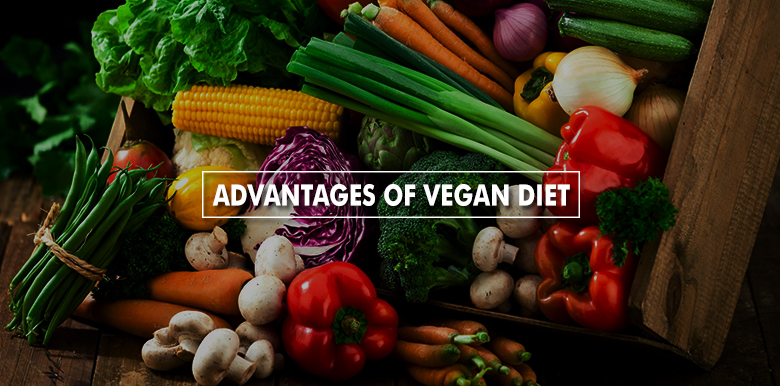Vegans take basic vegetarianism several steps further. Instead of abstaining only from eating fish and meat, vegans avoid eating, wearing or using any animal products. This means no eggs or dairy, no honey, no leather, fur, wool or silk, and no cosmetics or chemicals tested on animals.Vegans choose their diet for a variety of reasons. Many abstain from animal products because they find factory farming cruel and inhumane. Others believe that animal agriculture destroys the environment. And some simply view veganism as a healthy diet — one inherently low in fat, calories, and cholesterol and high in fiber and vitamins.
While vegan diets have shown to be effective in fighting against heart disease, diabetes, obesity, and many other chronic health conditions, can it also be a useful tool for weight loss?
Vegan dieters actually saw the most weight loss, losing five pounds more than non-vegetarians, while vegetarians lost three pounds more.

Vegan diet
Below are five advantages of Vegan diet –
1. Vegan Diets Are Typically Higher in Fiber
A 1985 study of vegans, vegetarians, and omnivores found vegans consumed significantly more fiber—an average of 24g more per day—than omnivores. Another study associated vegans with healthier digestion, including more frequent bowel movements, than the other two groups. These findings stand up well today, since 95% of the U.S. population doesn’t get enough fiber.
Fiber intake is key for weight loss (and overall health) for more than just clockwork bowel movements. Fiber keeps us satiated and full until our next meal, and also helps prevent the temptation to snack. It regulates our blood pressure, keeps cholesterol levels low, and even boasts anti-inflammatory properties. These factors make a high-fiber diet essential for weight loss and maintenance.
2. Vegan Diets Are Typically Lower in Saturated Fat
The World Health Organization has urged us to consume no more than 10 percent of our calories from saturated fat, or approximately 22 grams per day if you’re on a 2,000 calorie diet. Saturated fat is associated with a higher risk for obesity, type 2 diabetes, cancer, heart disease, and overall mortality. In fact, 70 percent of Americans consume more than they should on a regular basis.
Cutting out animal products significantly reduces your saturated fat intake right off the bat. Whole food, plant-based diets emphasize heart-healthy unsaturated fats and “good” carbohydrates, allowing for a higher intake of fiber, antioxidants, vitamins, and minerals than the standard American diet.
3. Plant-Based Foods Are Typically Lower in Calories Than Animal Foods
You should naturally eat fewer calories on a vegan diet, since plants are lower in calories per serving than animal products. Foods like leafy greens, whole grains, fruits, and beans can be just as filling but have much less fat and fewer calories than meat, cheese, and eggs. Eating a diet rich in plant protein and fiber will easily fill you up on less than you’d need on a standard American diet.
4. Plant-Based Diets Could Give You More Energy
You may have heard professional athletes like Kyrie Irving say going vegan has given him more energy, but is that true for everyone? If you’re getting enough calories and eating the right kind of carbohydrates, it certainly could.
Your body has to work harder to process animal products than it does to process grains, nuts, seeds, and beans, so that alone could help you have improved energy. Your body thrives best on carbohydrates—which plant-based foods and diets are richer in overall. Ditching a low-carb diet for a healthy plant-based diet could certainly boost your energy levels, which can also help motivate you to make fitness a more regular part of your weight loss regimen.
5. Vegans Weigh Less Than Other Groups on Average
Vegan diets can be an effective tool for weight loss, but they probably aren’t for most of us. A brand-new study found we all react to diets differently, and it’s important to listen to your body throughout your entire weight loss journey, instead of keeping your eyes on the scale alone.
Why you should try Vegan?
There are many health benefits to eating a vegan diet, a diet which tends to be high in fiber and a number of different nutrients (specifically folic acid, vitamin C, vitamin E, potassium, and magnesium).
Another study in Nutrients showed that the benefits of this include having lower cholesterol levels and lower blood pressure, as well as being able to maintain a lower weight. All of these together can reduce your risk of heart disease. Being vegan also offers protection against type-2 diabetes, obesity and hypertension.
The NIH further noted that people who ate a plant-based diet had “a lower rate of death due to cardiovascular disease, diabetes, and renal disorders such as kidney failure,” specifically. The numbers also showed that this link was stronger for men than for women.
Although eating a vegan diet provides a lot of benefits, transitioning to a food plan that no longer includes meat can be a challenge for some people.
